Ah, the sandwich. One of Britain’s greatest gifts to gastronomy in general and the working class in particular. Though praised by those who have to walk around while they eat, this versatile, utilitarian food item is credited to John Montagu, 4th Earl of Sandwich. Like its Mexican cousin, the taco, or its Mediterranean counterpart, the gyro, the sandwich has endured throughout centuries. Charlottesville–whose central Virginia land is fertile ground for both the farm-to-table movement and an overall appreciation for all things craft food–has more than its fair share of dynamite sandwich shops. But, alas, this is a top 5 list, and it’s our job to bring those 5 to you. Without further ado:
1. Ivy Provisions
Ivy Provisions (or IvyP, as it is affectionately known) is like something out of a dream. It’s a smorgasbord of creative sandwiches ranging from light and fresh to coma-inducing, and everything in between. While $8-10 is a little steep for a sandwich, you definitely get what you pay for at this place, with its emphasis on local ingredients from Charlottesville. At the helm here is Tommy Lasley, former head chef of Orzo and part-owner of Fry’s Spring Station Pizza. The concept is quick, inventive sandwiches and salads with high-quality ingredients. A long-lasting partnership with The Rock Barn means that local pork raised and butchered on Nelson County farmland is a given. Whether you’re thinking about sandwiches like the Notorious P.I.G. (salami, prosciutto, Rock Barn capicola, provolone, peppers, onion, lettuce, oil & vinegar), or the specialty off-menu Cvilly Cheese (roast beef au jus, grilled onions, hot peppers, and sweet peppers with a smoky, creamy cheese sauce), every option is available on a bed of greens instead of a sandwich (although we’re not sure how a steak and cheese sandwich would work out). Their breakfast and espresso options are nothing to scoff at either. The Sloppy Jose is a brilliant chorizo, egg, and pimento sandwich on an English muffin.
Favorite sandwich (pictured above): IvyP Banh mi-roasted pork, pâté, ham, cabbage, cilantro, pickled vegetables, mayo & chile oil served warm on baguette
2. Revolutionary Soup
Soup, salads, and sandwiches…the trifecta. This Cville staple has locations on the pedestrian downtown mall and The Corner (by the University of Virginia). The staff is friendly, polite, and incredibly good at their work, churning out thoughtful craft sandwiches with efficiency during one of the most infamous lunch rushes in the downtown Charlottesville area. Their fare extends beyond the strict territory of the “sandwich,” with items like quesadillas and shrimp and grits providing some alternatives. The titular soup is a must for any rainy day; this author had the flu one week and pretty much lived off of the lamb curry, with its spicy lentils, spinach, and cilantro. Whenever possible, Rev Soup (as it’s known in the neighborhood) strives to use local ingredients. A big part of their philosophy is sourcing ingredients from farms in central Virginia and the surrounding areas, whether it be bread from Albemarle Baking Co. or BreadWorks, or tofu from Twin Oaks Farm in Louisa, etc. At the end of the day, you can drop by for a $3 grilled cheese on bread baked 10 minutes away and delivered that morning. Sounds like a win to us.
Favorite sandwich (pictured): The 90’s Club-local chicken breast, bacon, cheddar, avocado, lettuce, tomato, red onion, and a house sauce on a kaiser roll
3. Littlejohn’s
Remember that part about sandwiches being utilitarian? Littlejohn’s is maybe the only 24-hour restaurant in Charlottesville proper (with the possible exception of Waffle House). They don’t boast any fancy local ingredients, but the fact of the matter is, when you are hungry and alone after a night out, Littlejohn’s is there for you, with a hot, fresh, greasy sandwich and a big glass of water. (When you watched the movie Psycho with its creepy shower scene and jarring use of violins, you woke up at 5am with nightmares and Littlejohn’s had a bacon, egg, and cheese breakfast bagel ready for you, and a big glass of orange juice to wash away the night terrors. When you were in the library cramming for your 9 am final and your body started crying out for food…well you get the idea.) Dependability is a decidedly utilitarian feature in any sandwich shop, and so we must pay homage to LJs, our rock. It’s not just greasy goodness either. They have an entire chalkboard devoted to “lighter fare” which includes some flatbread delicacies and salads that are not terrible. But after a long night, you might just want to double down and opt for something with bacon, butter, and cheese. You deserve it. We know you do.
Favorite sandwich: Chipotle chicken-shredded and seasoned chicken, spicy chipotle mayo, bacon, sautéed onions, lettuce, tomato and melted provolone (hot peppers optional).
4. Bellair Market
We almost feel guilty including Bellair Market on this list. A little lunch counter, tucked away inside an innocuous Exxon Tiger Fuel gas station, Bellair Market is one of the city’s best-kept secrets. Once you get the lay of the land in Charlottesville, it’s hard to overestimate the value of a well-kept secret…especially when it comes to food. Technically the “Market” has a few locations, but it’s important to note that the sandwiches at the Ivy Road location are the sole reason for the Bellair’s inclusion on this list. In true Cville fashion, Bellair’s specialty sandwiches are named after regions in the greater Charlottesville area. Often, these are rural areas in central Virginia; for example the Keswick (country ham, swiss, honey mustard, lettuce, tomato, herb mayonnaise on French bread), the Earlysville (sweet ham, turkey, smoked gouda, bacon, lettuce, tomato, and herb mayonnaise on sourdough) or the Montpelier (rare roast beef, cheddar, lettuce, tomato, and horseradish mayo on French bread), named after James Madison’s famous estate in Orange County. Gas station gourmet is a staple of the South, and Charlottesville in particular, so we had to include this gem.
Favorite sandwich: the Jefferson-maple turkey, cranberry relish, cheddar lettuce, herb mayonnaise, french bread
5. Market Street Market
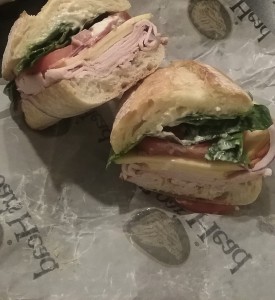
Like Revolutionary Soup, Market Street Market is located just off Charlottesville’s downtown mall. It’s right on Market Street, making it a popular pop-in for busy retail and office professionals, lawyers, city officials, and all hungry people. The bulk of the space is devoted to a small, upscale grocery store with a wealth of locally sourced products including produce from surrounding central Virginia farms, fresh baked goods from Albemarle Baking Co. and Mission Home (try the peanut blossom cookies!), and a great craft beer selection. But the deli is the heart of the store, the ever-churning furnace that breathes life into the establishment and its patrons. At this juncture it’s worth noting that Market Street Market has some of the classiest background music of all time, and it’s the perfect volume (audible but not distracting). You can build your own sandwich starting at $3.99. But there are some truly inspired specialty sandwiches and salads. The gals and guys at Market Street Market run a tight ship and service is pretty fast, but don’t be surprised if you stop in at 11:15 and end up waiting 15 minutes. The key is to pop by just before or after the lunch rush hour…but there’s no hurry, because this deli is serving fresh, made-to-order sandwiches until 8pm!
Favorite sandwich: Custom-cracked peppermill turkey, smoked gouda, spinach, tomato, red onion and mayonnaise


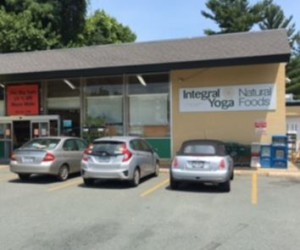 Commonly abbreviated “IY,” this health food haven has been locally owned since 1975. You won’t find many (if any) animal products here, but the store carries more than its fair share of meat alternatives (think black bean burgers and Twin Oaks Tofu) but the place really shines when it comes to its produce, fresh and local. IY’s sourcing philosophy is both old-school and new age: they will buy produce from anyone in the area, whether it be a Charlottesville-area farm like Sharondale Farm in Keswick or a guy with a bunch of berries in his backyard. They are partnered with over 30 area farms and boast over 30 local Charlottesville chains, but you don’t have to be over 30 to go in. There is an extremely slim chance that you’ll be able to walk into IY and buy something that isn’t a local product, whether a cup of coffee or a bag of granola. Now that’s commitment to neighborhood partnership! Integral Yoga’s crown jewel may be its juice/smoothie bar, at which you can buy a 16 oz juice with your choice of local frozen fruit. A 16 oz serving of juice packs a walloping five pounds of fruit! And they will cater to any and all dietary restrictions or preferences.
Commonly abbreviated “IY,” this health food haven has been locally owned since 1975. You won’t find many (if any) animal products here, but the store carries more than its fair share of meat alternatives (think black bean burgers and Twin Oaks Tofu) but the place really shines when it comes to its produce, fresh and local. IY’s sourcing philosophy is both old-school and new age: they will buy produce from anyone in the area, whether it be a Charlottesville-area farm like Sharondale Farm in Keswick or a guy with a bunch of berries in his backyard. They are partnered with over 30 area farms and boast over 30 local Charlottesville chains, but you don’t have to be over 30 to go in. There is an extremely slim chance that you’ll be able to walk into IY and buy something that isn’t a local product, whether a cup of coffee or a bag of granola. Now that’s commitment to neighborhood partnership! Integral Yoga’s crown jewel may be its juice/smoothie bar, at which you can buy a 16 oz juice with your choice of local frozen fruit. A 16 oz serving of juice packs a walloping five pounds of fruit! And they will cater to any and all dietary restrictions or preferences.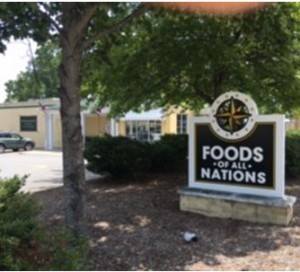 Foods of All Nations is nothing short of a Cville staple at this point. Its warm, friendly, and inviting staff have been bridging the gap between central Virginia farms and the people they serve for over 50 years, during which they’ve developed both an extensive supply of local, domestic, and international foods. A lot of the produce is locally-sourced, and most of their meats and seafoods are direct from farms in the central Virginia area. What’s more, the folks at Foods of All Nations put as much work into cooking the ingredients as the Charlottesville farmers do growing them. The hot bar and deli have some of the best low-key food in the city, so before you buy a couple pounds of oysters, try, for example the oyster po’boy with okra and homemade remoulade. While you’re at it, get me some gazpacho. It goes without saying, but Foods of All Nations is partnered with a bunch of local businesses…Caromont Farm, Keswick Gourmet Foods, Polyface Farms, and Wade’s Mill just to name a few.
Foods of All Nations is nothing short of a Cville staple at this point. Its warm, friendly, and inviting staff have been bridging the gap between central Virginia farms and the people they serve for over 50 years, during which they’ve developed both an extensive supply of local, domestic, and international foods. A lot of the produce is locally-sourced, and most of their meats and seafoods are direct from farms in the central Virginia area. What’s more, the folks at Foods of All Nations put as much work into cooking the ingredients as the Charlottesville farmers do growing them. The hot bar and deli have some of the best low-key food in the city, so before you buy a couple pounds of oysters, try, for example the oyster po’boy with okra and homemade remoulade. While you’re at it, get me some gazpacho. It goes without saying, but Foods of All Nations is partnered with a bunch of local businesses…Caromont Farm, Keswick Gourmet Foods, Polyface Farms, and Wade’s Mill just to name a few.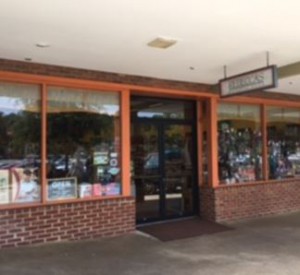 Norman Dill has been working in health food stores since 1976. He opened up Rebecca’s in 1987, naming it after his daughter and basing its core aesthetic on food principles set down at his mother’s table (no junk food!) The result is a health food store dedicated to selling only the most salubrious offerings, whether we’re talking produce, kombucha, or supplements. Rebecca’s is committed to selling only safe products with few or no side effects, and their wares are always local when possible and rarely (if ever) processed. There is an appreciation for ancestral eating: the practice of modifying our dietary inclinations to match those of ancient peoples (think the “paleo diet.”) And like Integral Yoga, they offer a plethora of local brands: Barefoot Bucha, Free Union Grass Farm (a local Charlottesville-area farm, meat and eggs), Mad Hatter Hot Sauce, etc. Check them out at the Barracks Road Shopping Center.
Norman Dill has been working in health food stores since 1976. He opened up Rebecca’s in 1987, naming it after his daughter and basing its core aesthetic on food principles set down at his mother’s table (no junk food!) The result is a health food store dedicated to selling only the most salubrious offerings, whether we’re talking produce, kombucha, or supplements. Rebecca’s is committed to selling only safe products with few or no side effects, and their wares are always local when possible and rarely (if ever) processed. There is an appreciation for ancestral eating: the practice of modifying our dietary inclinations to match those of ancient peoples (think the “paleo diet.”) And like Integral Yoga, they offer a plethora of local brands: Barefoot Bucha, Free Union Grass Farm (a local Charlottesville-area farm, meat and eggs), Mad Hatter Hot Sauce, etc. Check them out at the Barracks Road Shopping Center.
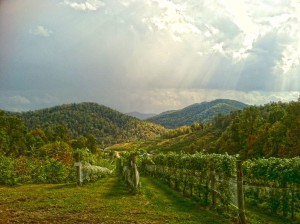 You might as well refer to the land outside Charlottesville as beer/wine country. The rolling hillsides of Albemarle County and beyond are incredibly well-suited to breweries and vineyards. The past few years especially have seen an explosion of craft breweries like Blue Mountain Brewery in Nelson County, the brand spankin’ new Pro Re Nata in Crozet, or the flagship Starr Hill which was founded in 1999, technically on Charlottesville land (though now in Crozet). Wine aficionados will appreciate knowing that central Virginia land has robust, exquisite terroir…many compare the farms and pastures of the Piedmont region to southern Italy for this reason. Barboursville Vineyards in particular has become a formidable winery whose influence is not relegated to just Virginia…they move 35,000 cases of wine a year, and Queen Elizabeth II herself has sampled their fares.
You might as well refer to the land outside Charlottesville as beer/wine country. The rolling hillsides of Albemarle County and beyond are incredibly well-suited to breweries and vineyards. The past few years especially have seen an explosion of craft breweries like Blue Mountain Brewery in Nelson County, the brand spankin’ new Pro Re Nata in Crozet, or the flagship Starr Hill which was founded in 1999, technically on Charlottesville land (though now in Crozet). Wine aficionados will appreciate knowing that central Virginia land has robust, exquisite terroir…many compare the farms and pastures of the Piedmont region to southern Italy for this reason. Barboursville Vineyards in particular has become a formidable winery whose influence is not relegated to just Virginia…they move 35,000 cases of wine a year, and Queen Elizabeth II herself has sampled their fares.